TONIC STRESS The subject phrase contains ‘given’ (old)

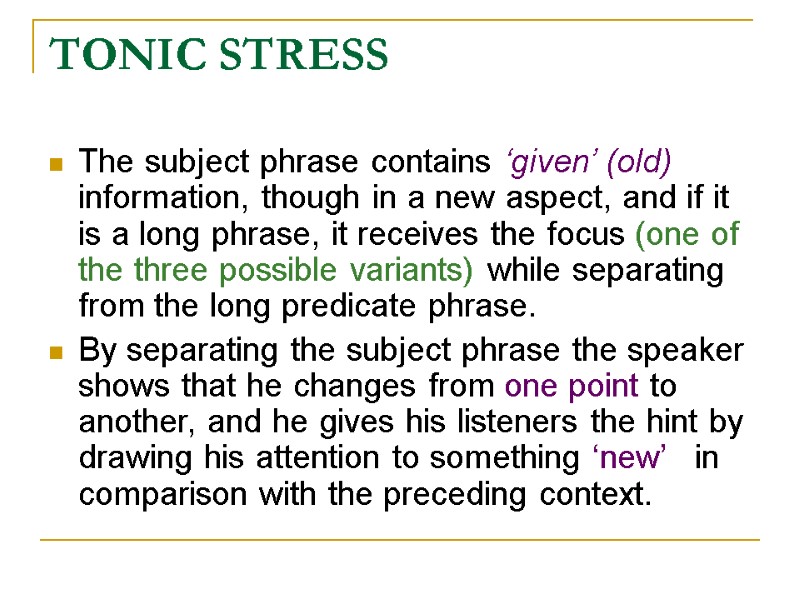
TONIC STRESS The subject phrase contains ‘given’ (old) information, though in a new aspect, and if it is a long phrase, it receives the focus (one of the three possible variants) while separating from the long predicate phrase. By separating the subject phrase the speaker shows that he changes from one point to another, and he gives his listeners the hint by drawing his attention to something ‘new’ in comparison with the preceding context.
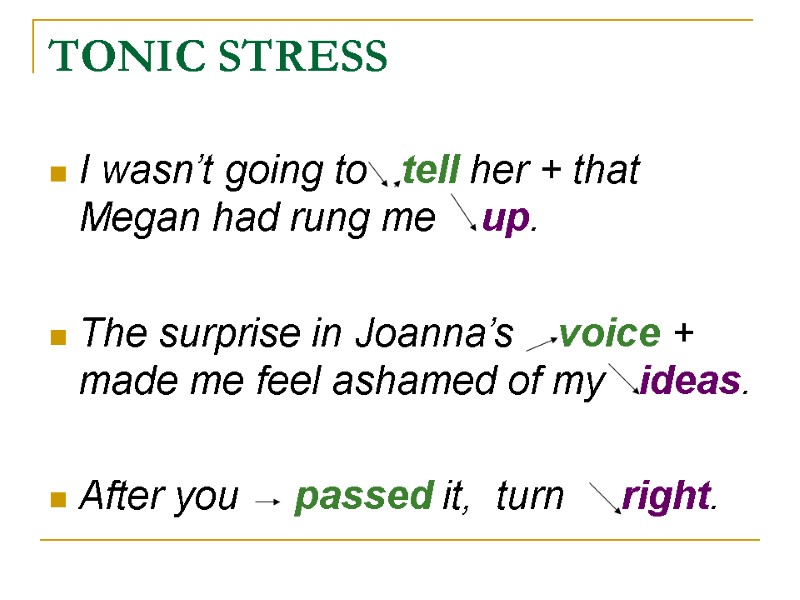
TONIC STRESS I wasn’t going to tell her + that Megan had rung me up. The surprise in Joanna’s voice + made me feel ashamed of my ideas. After you passed it, turn right.
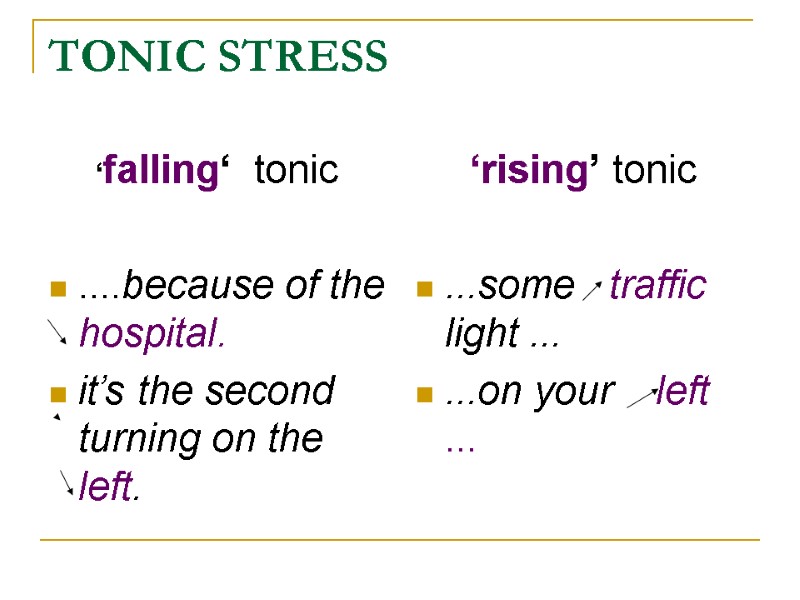
TONIC STRESS ‘falling‘ tonic ....because of the hospital. it’s the second turning on the left. ‘rising’ tonic ...some traffic light ... ...on your left ...
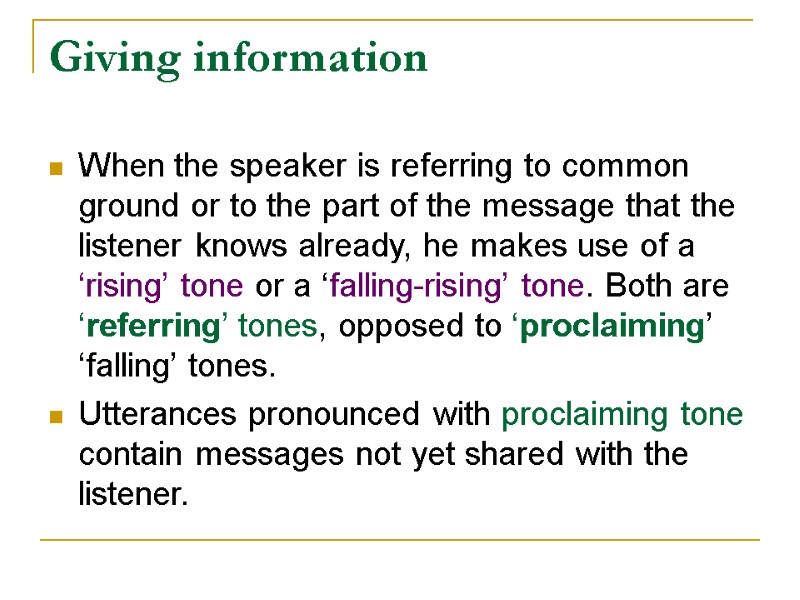
Giving information When the speaker is referring to common ground or to the part of the message that the listener knows already, he makes use of a ‘rising’ tone or a ‘falling-rising’ tone. Both are ‘referring’ tones, opposed to ‘proclaiming’ ‘falling’ tones. Utterances pronounced with proclaiming tone contain messages not yet shared with the listener.
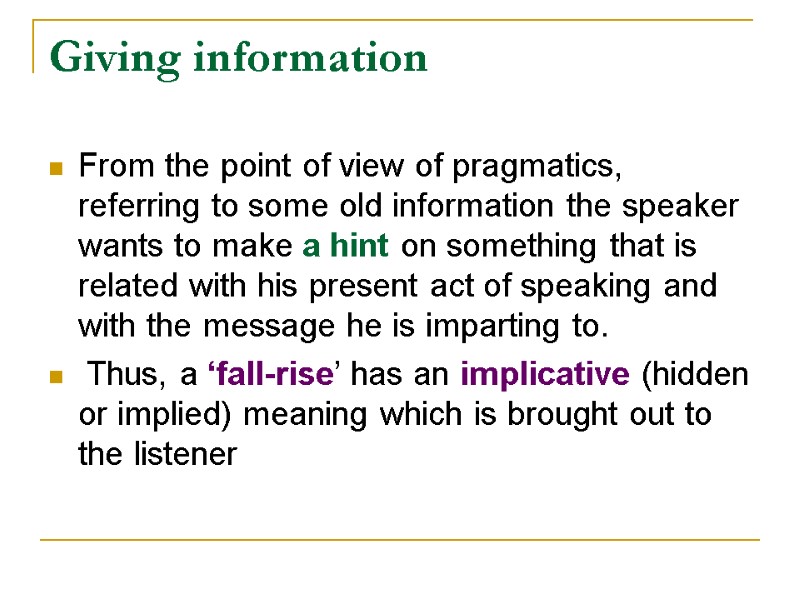
Giving information From the point of view of pragmatics, referring to some old information the speaker wants to make a hint on something that is related with his present act of speaking and with the message he is imparting to. Thus, a ‘fall-rise’ has an implicative (hidden or implied) meaning which is brought out to the listener
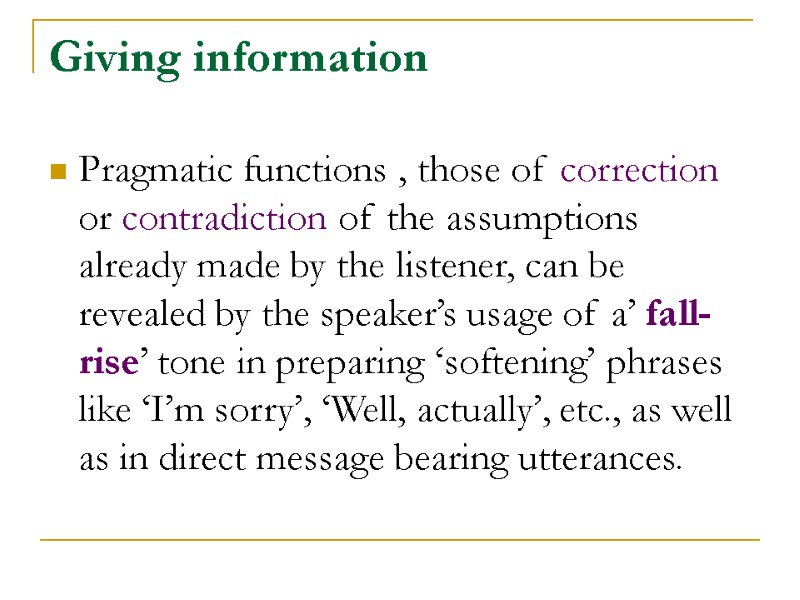
Giving information Pragmatic functions , those of correction or contradiction of the assumptions already made by the listener, can be revealed by the speaker’s usage of a’ fall-rise’ tone in preparing ‘softening’ phrases like ‘I’m sorry’, ‘Well, actually’, etc., as well as in direct message bearing utterances.
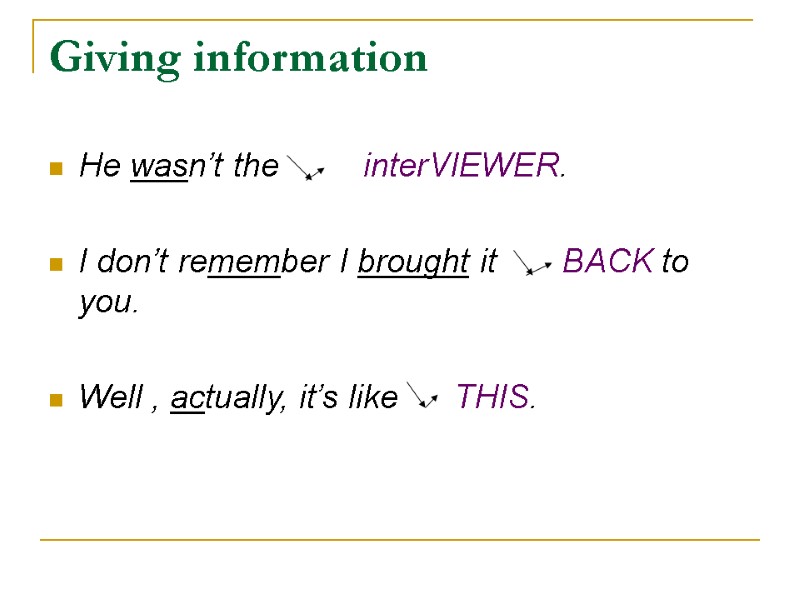
Giving information He wasn’t the interVIEWER. I don’t remember I brought it BACK to you. Well , actually, it’s like THIS.
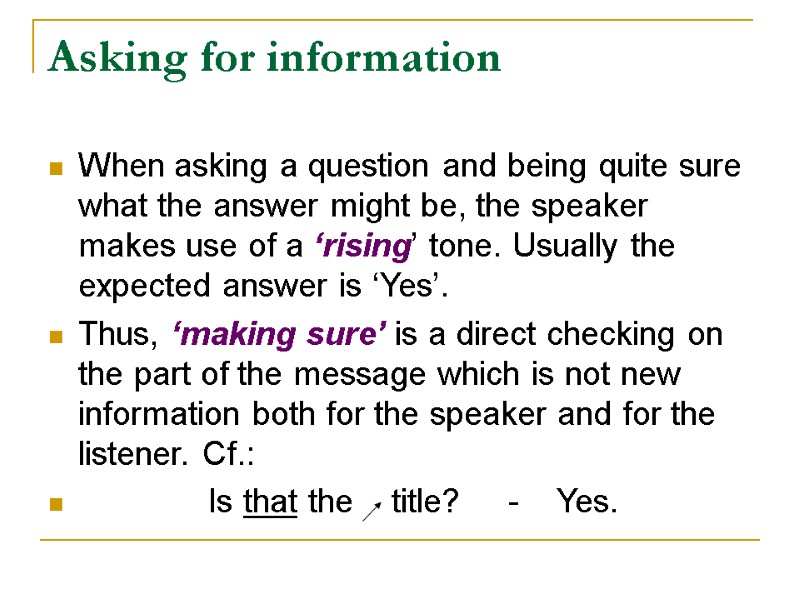
Asking for information When asking a question and being quite sure what the answer might be, the speaker makes use of a ‘rising’ tone. Usually the expected answer is ‘Yes’. Thus, ‘making sure’ is a direct checking on the part of the message which is not new information both for the speaker and for the listener. Cf.: Is that the title? - Yes.
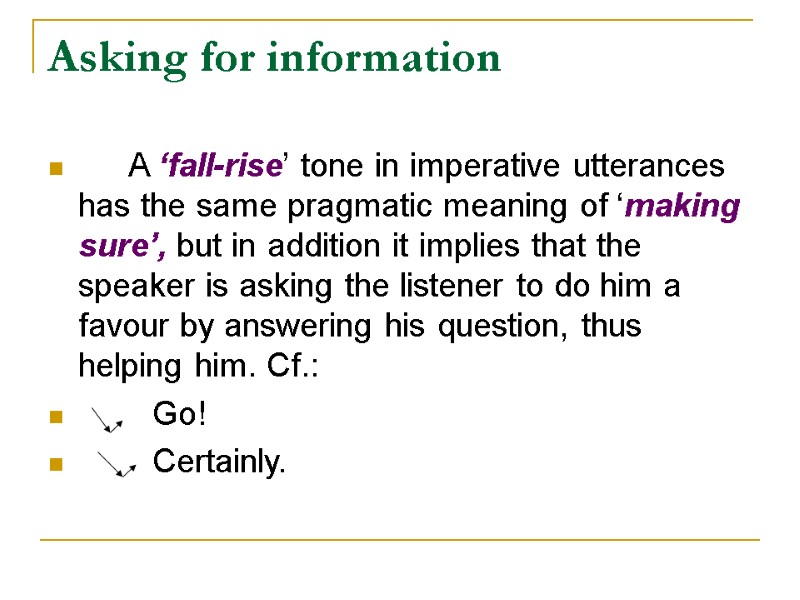
Asking for information A ‘fall-rise’ tone in imperative utterances has the same pragmatic meaning of ‘making sure’, but in addition it implies that the speaker is asking the listener to do him a favour by answering his question, thus helping him. Cf.: Go! Certainly.
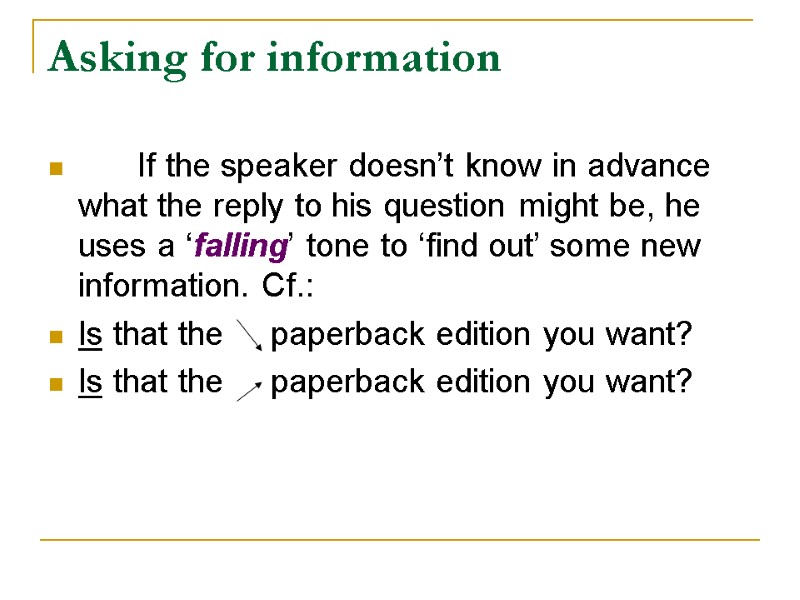
Asking for information If the speaker doesn’t know in advance what the reply to his question might be, he uses a ‘falling’ tone to ‘find out’ some new information. Cf.: Is that the paperback edition you want? Is that the paperback edition you want?
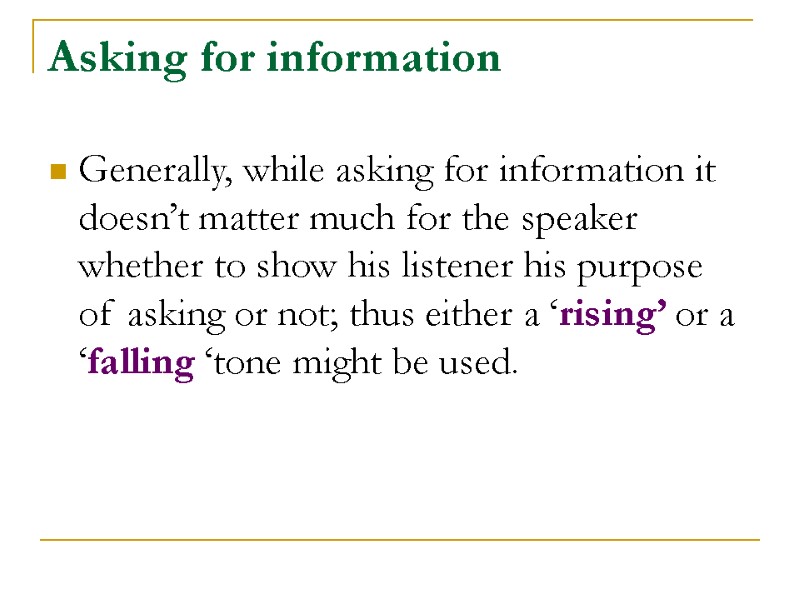
Asking for information Generally, while asking for information it doesn’t matter much for the speaker whether to show his listener his purpose of asking or not; thus either a ‘rising’ or a ‘falling ‘tone might be used.
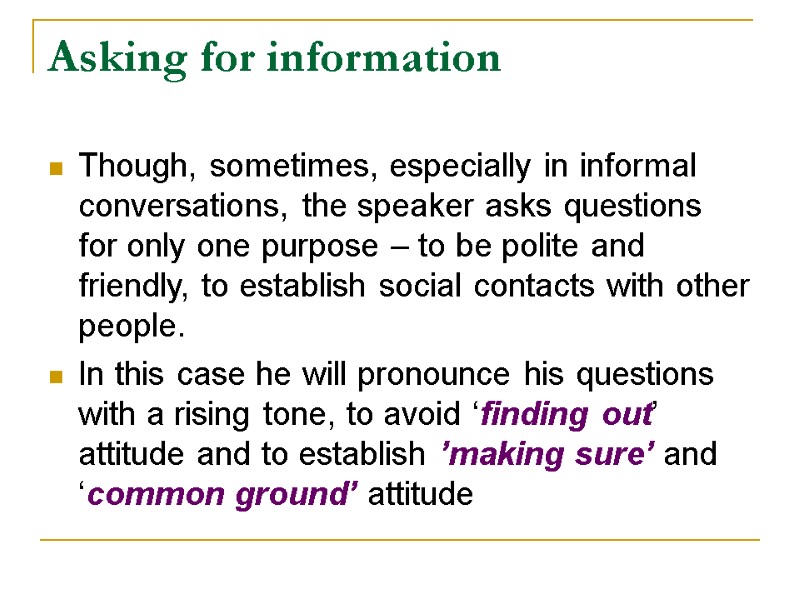
Asking for information Though, sometimes, especially in informal conversations, the speaker asks questions for only one purpose – to be polite and friendly, to establish social contacts with other people. In this case he will pronounce his questions with a rising tone, to avoid ‘finding out’ attitude and to establish ’making sure’ and ‘common ground’ attitude
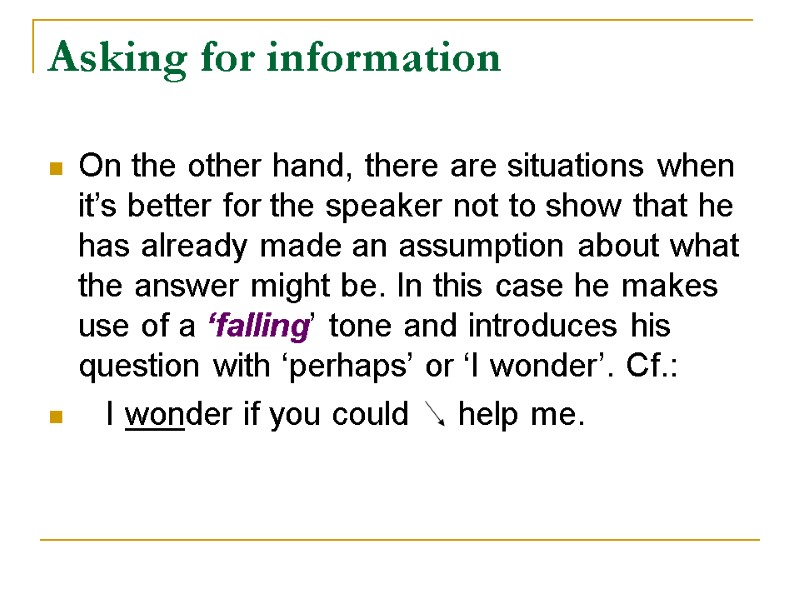
Asking for information On the other hand, there are situations when it’s better for the speaker not to show that he has already made an assumption about what the answer might be. In this case he makes use of a ‘falling’ tone and introduces his question with ‘perhaps’ or ‘I wonder’. Cf.: I wonder if you could help me.
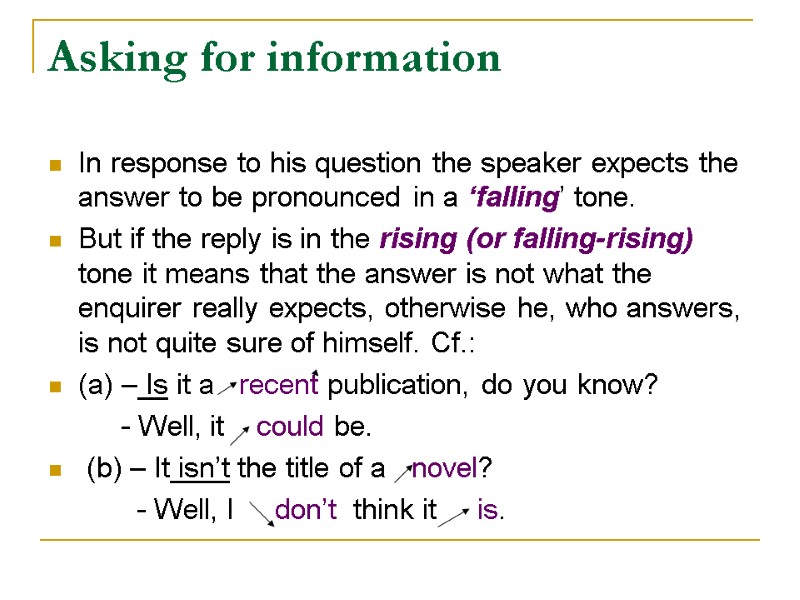
Asking for information In response to his question the speaker expects the answer to be pronounced in a ‘falling’ tone. But if the reply is in the rising (or falling-rising) tone it means that the answer is not what the enquirer really expects, otherwise he, who answers, is not quite sure of himself. Cf.: (a) – Is it a recent publication, do you know? - Well, it could be. (b) – It isn’t the title of a novel? - Well, I don’t think it is.
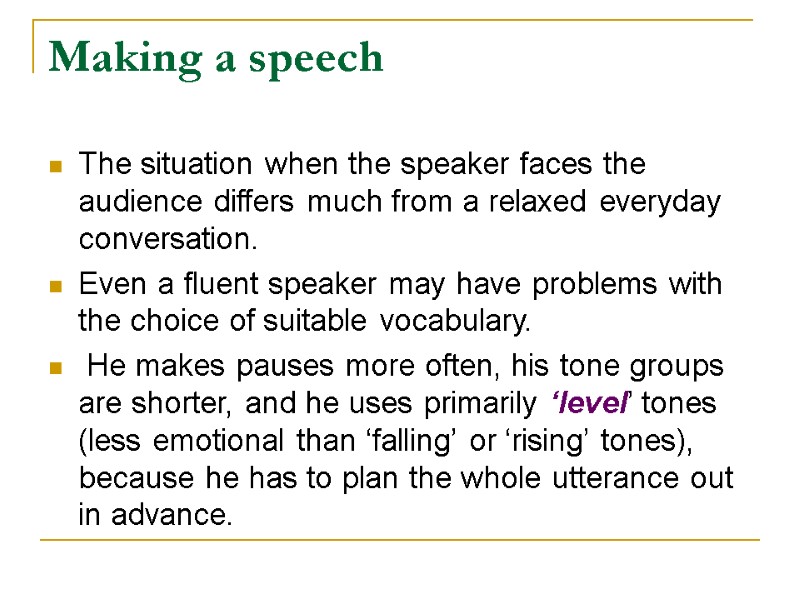
Making a speech The situation when the speaker faces the audience differs much from a relaxed everyday conversation. Even a fluent speaker may have problems with the choice of suitable vocabulary. He makes pauses more often, his tone groups are shorter, and he uses primarily ‘level’ tones (less emotional than ‘falling’ or ‘rising’ tones), because he has to plan the whole utterance out in advance.
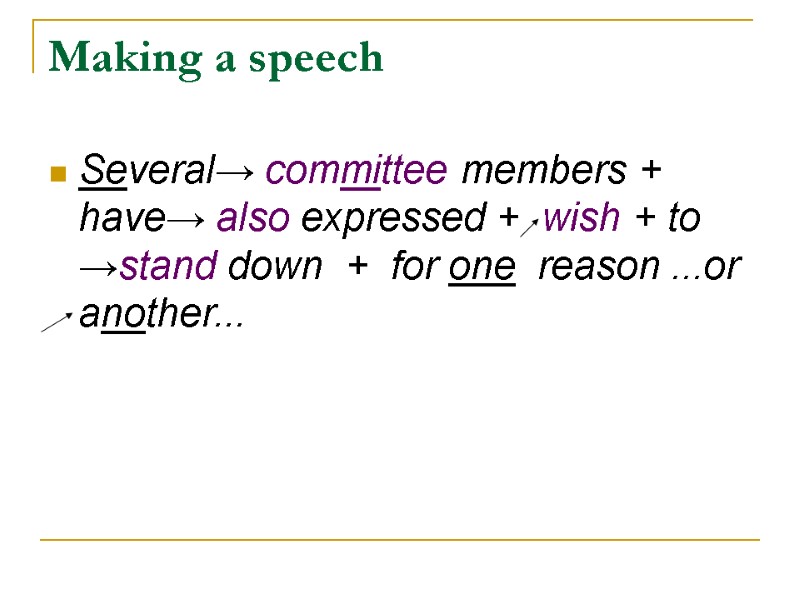
Making a speech Several→ committee members + have→ also expressed + wish + to →stand down + for one reason ...or another...
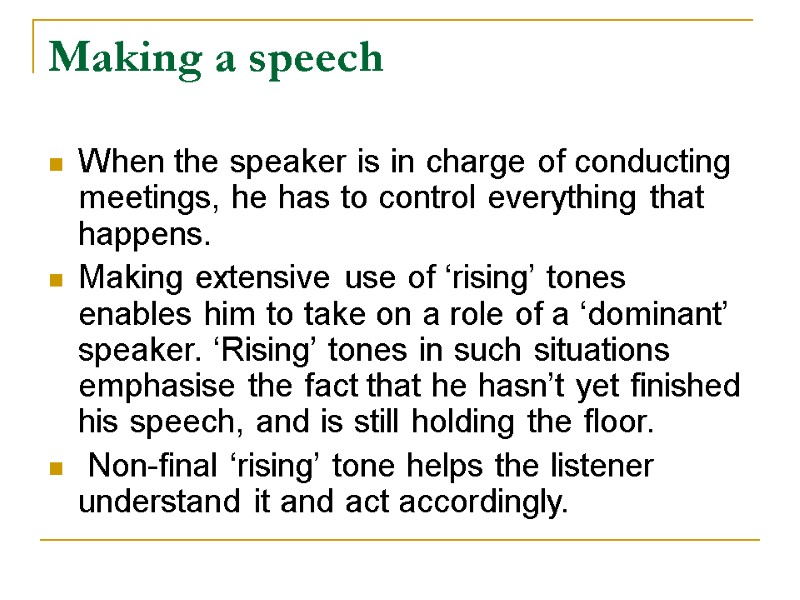
Making a speech When the speaker is in charge of conducting meetings, he has to control everything that happens. Making extensive use of ‘rising’ tones enables him to take on a role of a ‘dominant’ speaker. ‘Rising’ tones in such situations emphasise the fact that he hasn’t yet finished his speech, and is still holding the floor. Non-final ‘rising’ tone helps the listener understand it and act accordingly.
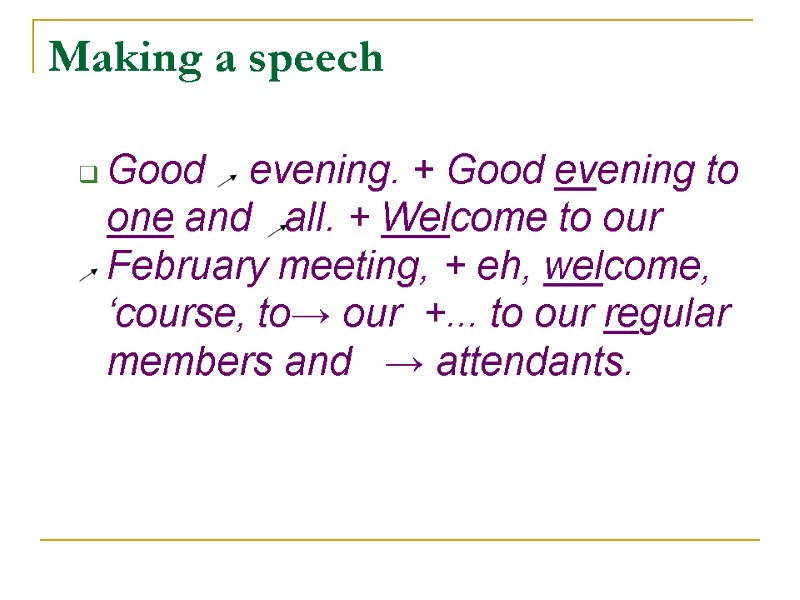
Making a speech Good evening. + Good evening to one and all. + Welcome to our February meeting, + eh, welcome, ‘course, to→ our +... to our regular members and → attendants.
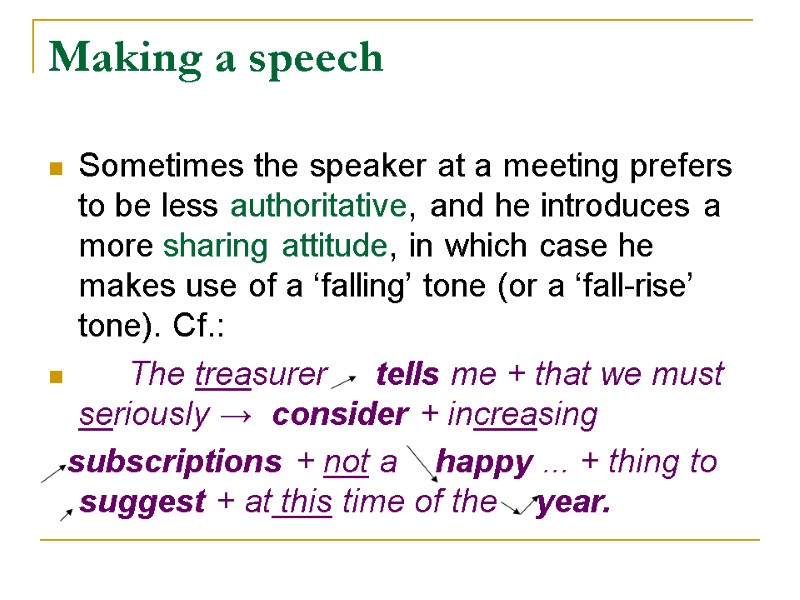
Making a speech Sometimes the speaker at a meeting prefers to be less authoritative, and he introduces a more sharing attitude, in which case he makes use of a ‘falling’ tone (or a ‘fall-rise’ tone). Cf.: The treasurer tells me + that we must seriously → consider + increasing subscriptions + not a happy ... + thing to suggest + at this time of the year.
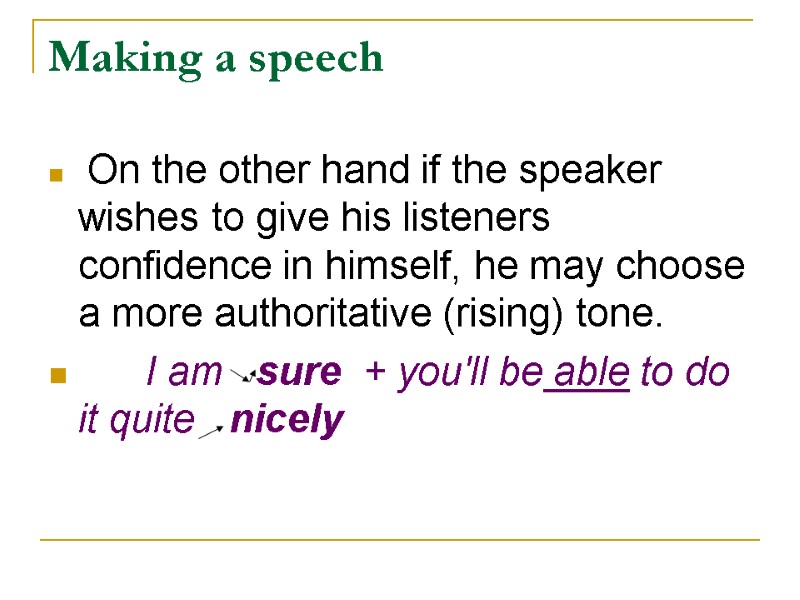
Making a speech On the other hand if the speaker wishes to give his listeners confidence in himself, he may choose a more authoritative (rising) tone. I am sure + you'll be able to do it quite nicely
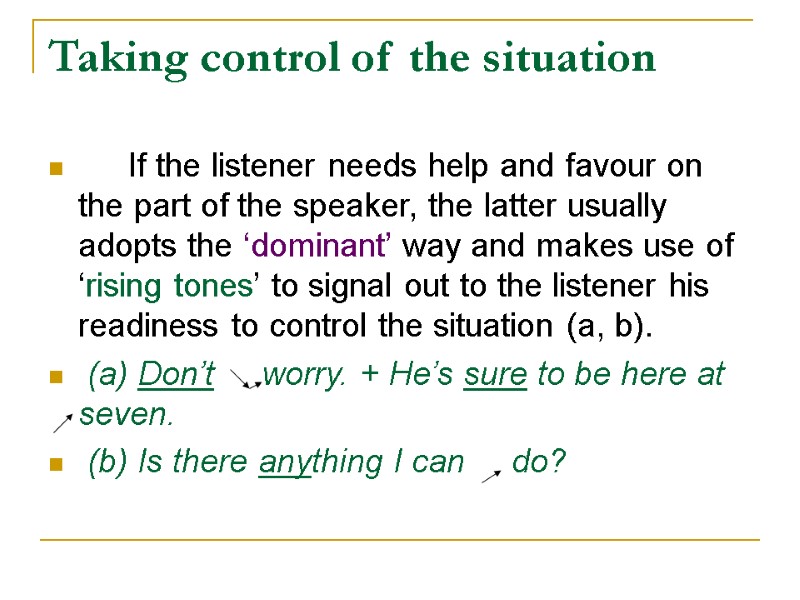
Taking control of the situation If the listener needs help and favour on the part of the speaker, the latter usually adopts the ‘dominant’ way and makes use of ‘rising tones’ to signal out to the listener his readiness to control the situation (a, b). (a) Don’t worry. + He’s sure to be here at seven. (b) Is there anything I can do?
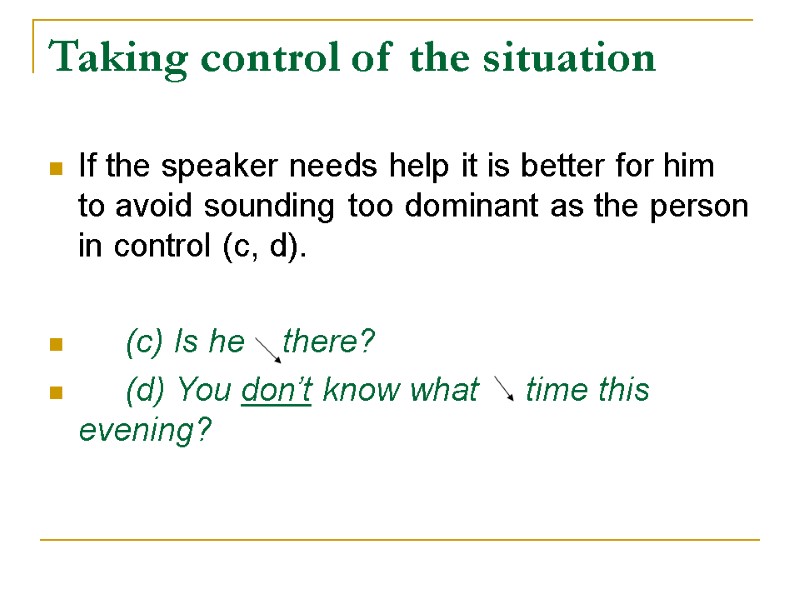
Taking control of the situation If the speaker needs help it is better for him to avoid sounding too dominant as the person in control (c, d). (c) Is he there? (d) You don’t know what time this evening?
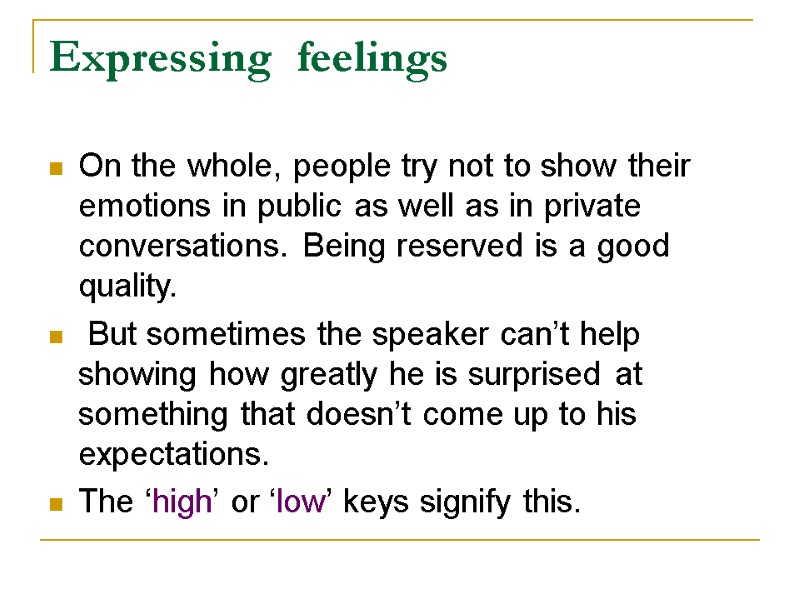
Expressing feelings On the whole, people try not to show their emotions in public as well as in private conversations. Being reserved is a good quality. But sometimes the speaker can’t help showing how greatly he is surprised at something that doesn’t come up to his expectations. The ‘high’ or ‘low’ keys signify this.
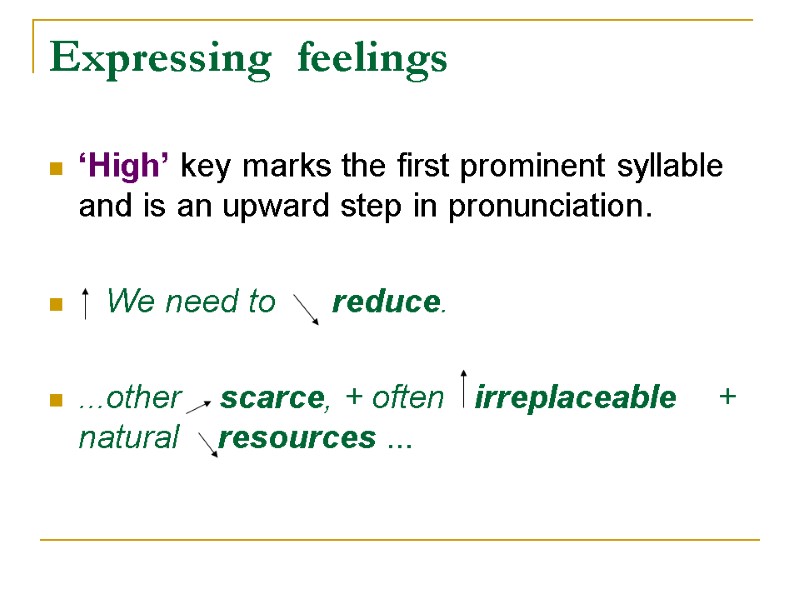
Expressing feelings ‘High’ key marks the first prominent syllable and is an upward step in pronunciation. We need to reduce. ...other scarce, + often irreplaceable + natural resources ...
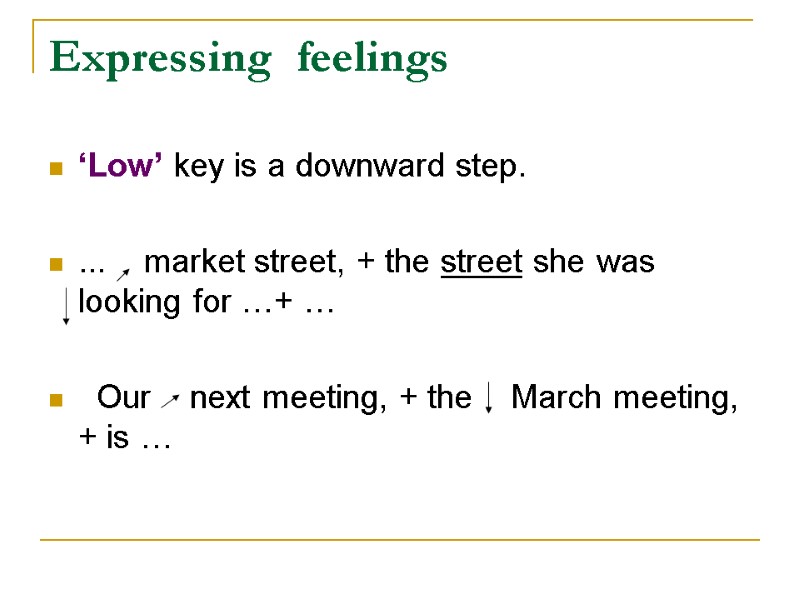
Expressing feelings ‘Low’ key is a downward step. ... market street, + the street she was looking for …+ … Our next meeting, + the March meeting, + is …
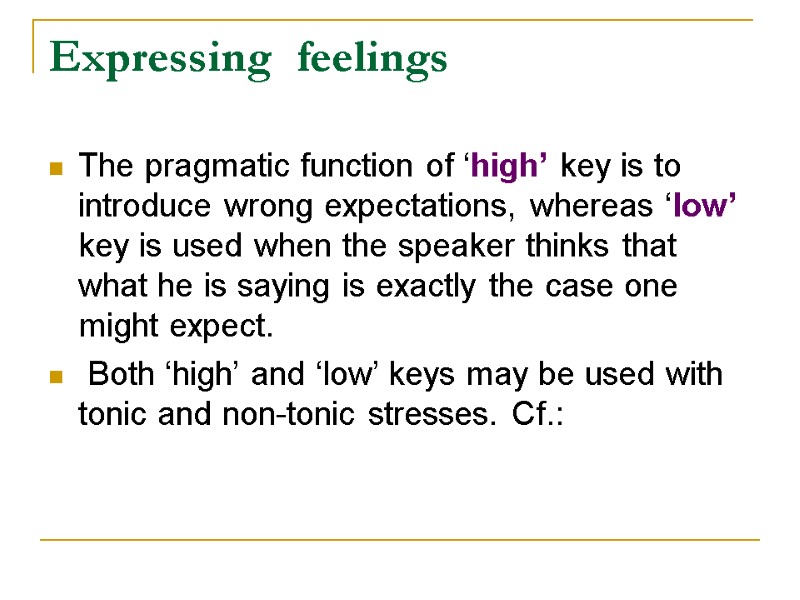
Expressing feelings The pragmatic function of ‘high’ key is to introduce wrong expectations, whereas ‘low’ key is used when the speaker thinks that what he is saying is exactly the case one might expect. Both ‘high’ and ‘low’ keys may be used with tonic and non-tonic stresses. Cf.:
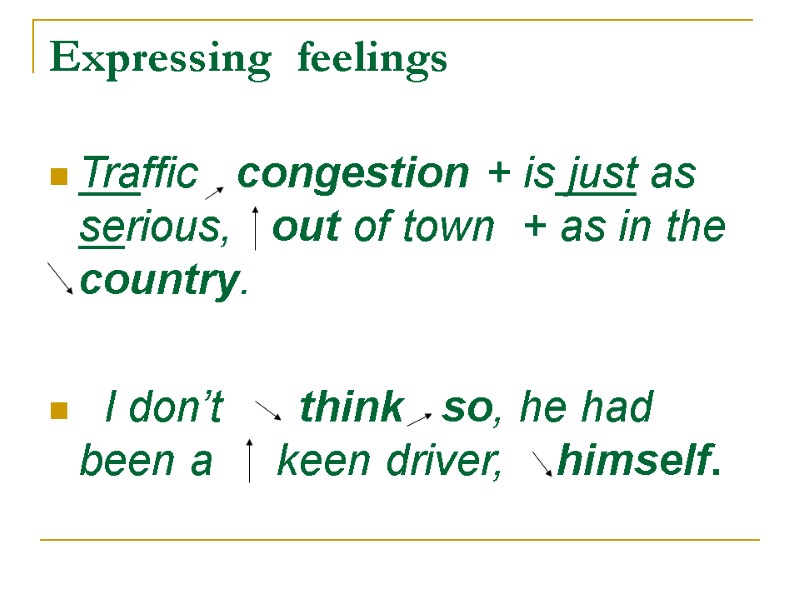
Expressing feelings Traffic congestion + is just as serious, out of town + as in the country. I don’t think so, he had been a keen driver, himself.
7568-tonic_stress.ppt
- Количество слайдов: 27

